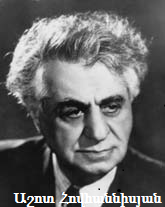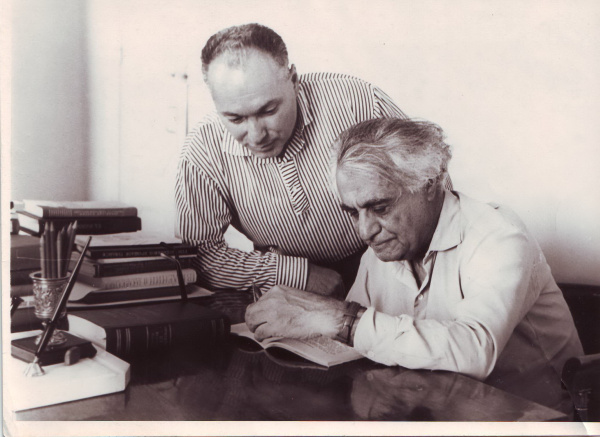
Historian, Ph.D., professor, and academician of the Academy of Sciences of the ASSR
Hovhannisyan was born on June 17, 1887, in Shushi. Studied at the local school. In 1906, after school, he went to Germany and studied at the universities of Jena, Halle, and Munich.
In 1913, A. Hovhannisyan graduated from the University of Munich and received a Ph.D. From 1913-1914, Hovhannisyan served at the Armenian Theological Seminary of Shushi, and from 1914-1917, at the Gevorgian Seminary of Etchmiadzin. Along with his teaching work, he conducted scientific research in the Etchmiadzin library and published their results in "Ararat" magazine and in separate booklets.
A. Hovhannisyan was a member of the Communist Party since 1906. In 1918, during the days of the Baku Commune, he headed the culture-enlightenment department of the Baku Council, and then the school department of the Enlightenment Commissariat. After the fall of the Commune, he went to Moscow, where he worked in the Commissariat of Nationalities Affairs as the head of the literature and history department and, at the same time, in 1918-1920, he led the Armenian section of the Light People's Committee of the RSFSR. In December 1920, he was appointed People's Commissar of Enlightenment of the ASSR. One of the first documents he signed during his tenure in that position was the order of December 17 "On the reorganization of Yerevan University". In 1922-1927, Hovhannisyan was the first secretary of the Communist (Bolshevik) Party of Armenia.
In 1921-1927 A. Hovhannisyan taught the history of the Armenian people and Leninism at YSU. In 1927-1937, he worked in Leningrad and Moscow scientific institutions.

He was also not spared from the violence of the Stalinist era. In 1937 was repressed, and after returning from exile in 1949 he was forced to live in Kirovakan (now Vanadzor) for five years.
In 1954, A. Hovhannisyan started working at the Institute of History of the Academy of Sciences of the ASSR as a senior researcher.
In 1955, Hovhannisyan defended a doctoral thesis. In 1960, he was elected Academician of the Academy of Sciences of the USSR, and from 1961, he headed the Department of New History of the Institute of History.
A. Hovhannisyan left a rich scientific legacy: "Israel Law and the Armenian Liberation Idea" (German, Munich, 1913), "The Problem of the Origin of the Armenian-Russian Orientation" (Ejmiatsin, 1921), "Episodes of the History of Armenian Liberation Thought" (Yerevan, 1957, 1959), are particularly important. The two-volume monographs "Nalbandian and his Time" (Yerevan, 1955, 1956) and the extensive preface to the collection of documents "Armenian-Russian relations in the first thirty years of the 18th century" (Russian, Yerevan, 1967).
Many historians were formed under his scientific leadership.
In 1967, Hovhannisyan was awarded the Order of Lenin.
He passed away on 11 June 1972, in Yerevan. Hovhannisyan’s bronze bust in the lobby of YSU's central building symbolizes the role of an outstanding party figure and scientist-pedagogue in the establishment and development of the university.

